#This is just one example of how we inadvertently sabotage our own lives.
Text
A curse heavy rant going off on mods in a classic ADHD emotional dysregulation style of using a nuke to crush a bug. Yes, I know what it is, I'm still pissed off, and I'm leaving it as an example of what happens with unmedicated ADHD and autism compounded with late night hours, stress, hypersensitivity (RSD), and anxiety.
This is why I should never have Force powers even though I want them. When my anger is triggered, everything around me burns.
My anger is born of emotional and/or physical pain. You can't feel afraid or sad if you're angry.
When I snap out of it, my heart drops in dread and serious regret at the destruction I caused.
It's below the readmore.
You've been warned.
Have a nice day. :)
Fuck off, Reddit mods. My posts are perfectly fine and follow your dumbass, hyper-specific rules that are way too controlling, you power-mongering piles of rancid squid shit. Deleting them is rude, and hurtful. And, NO, "You're supposed to know. If you don't know, I won't tell you," is the shittiest, laziest, most dismissive reply to ever exist and it solves NOTHING.
Like, how is someone supposed to know what they did wrong IF YOU DON'T FUCKING TELL THEM?!
I am someone who tries not to break any rules. I'm not a spammer, or a cringy little 9 year old troll annoying people because I think posting;
Penis
Penis
Penis
Penis
Penis
Penis
Penis
Penis
Penis
Penis
Penis
five million times is funny.
NO! I'm a normal person trying to follow your damn, stupid rules to interact with other people.
DO NOT FUCKING DELETE MY POST, YOU PEE-SIPPING COCKROACHES!!! IT'S UP THERE BECAUSE I NEED ASSISTANCE! I CAME TO YOU FOR HELP AND YOU SLAMMED THE DOOR IN MY FACE!!! YOU JUST DID WHAT EVERYONE IN MY LIFE HAS ALWAYS DONE; DISMISS ME AND GHOST ME LIKE I DON'T EXIST.
WELL FUCK YOU!
If I could blow up your stupid r/ page with a virus that destroys your HD, I would.
Eat egg farts and perish, you turd burglars.
I hate mods. I hate them with a passion and block them whenever I can. I do NOTHING to warrant ANY kind of disciplinary action, and yet HERE WE ARE!
They're all just looking for a way to flex their authority over you so they feel important in their little lives by crushing you under their jackboots and getting off on controlling people.
There has to be a way to delete all notifications so I don't have to see that and be re-hurt every single time I log into Reddit. I actively avoid reddit if I can because of that.
#What ADHD emotional dysregulation regarding explosive anger looks like#I am not proud of this.#I am a better person that this.#I left this here as an example.#If you find yourself doing this and feeling like you'd press the RED BUTTON if you had access to it without thinking twice#You might have emotional dysregulation.#A doctor will be able to definitively tell you. Not me.#This is just one example of how we inadvertently sabotage our own lives.#The number of rage-fueled posts I've written and deleted is easily in the thousands over the course of my life on the internet.#My reaction when my anger is triggered is to destroy the thing that hurt me.#Not just hurt it back. Beat it senseless into a pile of pulp unrecognizable from its original shape.#Complete and utter annihilation of the thing that caused me pain.#This is not healthy. I've spent my entire life working on it including taking anger management classes and therapy.
3 notes
·
View notes
Text
ESSAY: Stranger in a Stranger Land — How Chiaki J. Konaka Made Aughties Anime Terrifying
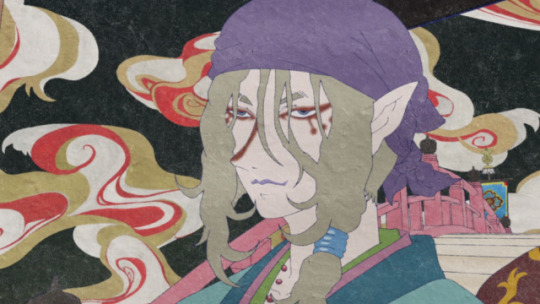
If you were watching anime in the early 2000s, you know who Chiaki J. Konaka is. If you didn’t know him by name, you were probably familiar with his work on cult classics like Serial Experiments Lain or Digimon Tamers. With other influential series like Texhnolyze, Air Gear, and Mononoke under his belt, Konaka’s work has no doubt become some of the major hallmarks of anime available to English-speaking audiences in the early aughts.
That being said, Konaka’s work has a reputation for pushing boundaries against the convention of genre. An avid fan of horror, Konaka’s career began in live-action home video movies and television, where he explored topics such as the supernatural, extraterrestrials, and cults. By the time Konaka began working on anime, he already had made a name for himself appealing to a broad demographic. Having written everything from episodes for the popular Gakkou Kaiden (Ghost Stories) live-action television series to niche monster movies, he demonstrated a sharp eye for conventions of each particular genre and more importantly, why they worked so well. One thing has remained consistent throughout Konaka's career: his commitment to a uniquely private brand of horror.
Girl, Interrupted
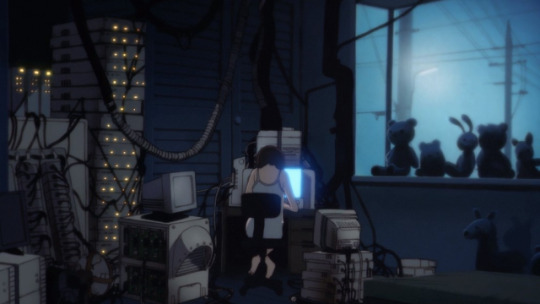
Lain in her room (Source: Funimation)
One of Konaka’s most prevalent themes is being a stranger in a strange land. Whether for the sake of narrative convenience or simplicity, many of Konaka’s protagonists — regardless of the material's genre — often find themselves in bizarre down-the-rabbit-hole scenarios. The most famous example of this is, of course, Serial Experiments Lain, a cyberpunk series about a deeply isolated girl who discovers an internet world called “The Wired.” Following the later-end of a cyberpunk boom in Japan with directors such as Shinya Tsukamoto and Mamoru Oshii accumulating international cult-followings, the verge of the new millennia couldn’t have been a better time for Konaka’s most iconic work to debut.
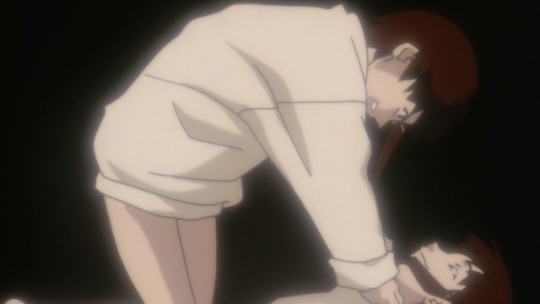
Lain confronts the fake Lain inside The Wired (Source: Funimation)
In an entry on his personal blog, Konaka writes that Lain was initially planned as an interface-heavy game for the PlayStation, which didn’t offer him many scenario writing opportunities. It was decided a 1998 late-night anime would be produced to promote the game, which would offer Konaka ample space to explore Lain’s world with fewer constraints. This approach to scriptwriting led to Lain’s infamously ambiguous story structure, which centered on Lain gaining access to The Wired and the various anonymous organizations vying for power within it. Unlike the PlayStation game, which relied heavily on players navigating a complex system of computer files about Lain, Konaka’s anime adaptation provides an intimate over-the-shoulder perspective. Lain, an introverted young girl, is quick to embrace a myriad of “other” Lain personae online. In episode 8 "Rumors," Lain returns to her own reality after confronting and attempting to kill one of the fake Lains in The Wired — only to find yet another "fake" Lain has somehow planted herself among her friend group. Whether it's a hallucination or not, it's a jarring moment of emotional whiplash and confirms Lain's fears aren't just online, but that her anxieties over her identity are becoming very real.

A "fake" Lain from The Wired among her real-world school friends (Source: Funimation)
For Lain, it becomes increasingly difficult to determine whether or not people like her or the internet's perverted image of her. The uncanniness Lain experiences isn’t a fear or helplessness to an almighty force or evil corporation like other cyberpunk stories. Rather, Lain’s biggest fears are these alarming encounters with her split virtual personalities — a stark reminder of who she may become after the inevitable collision between The Wired and reality. In the end, she is her own worst fear.
The Lovecraftian Connection
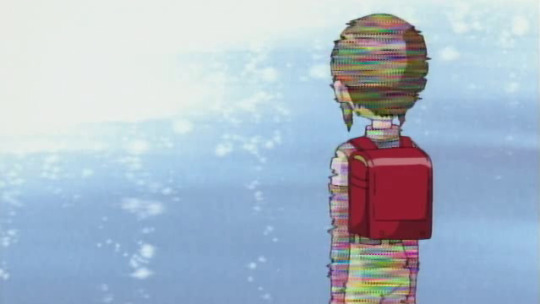
Gatomon watches Kairi "glitch" as she wanders across the street in a daze (Source: Hulu)
Although Konaka has certainly gained a reputation for his work flirting with cyberpunk, it’s by far no means the only format capable of unpacking these complicated themes of self-realization. Like many fascinated by the weird, Konaka is famously fixated on the works of American horror writer H.P. Lovecraft. It could even be argued Konaka is just a horror writer flirting with hybrid supernatural science-fiction. Much like the genre-omnivore his early writing credits would imply him to be, the way Konaka has approached a score of fantasy and cosmic-horror lend themselves to a far more liberal application of Lovecraftian tropes. This, of course, has given us some of the most unlikely mash-ups of thematic material, such as his episode “The Call of Dragomon” in Digimon Adventure's follow-up, Digimon Adventure 02.
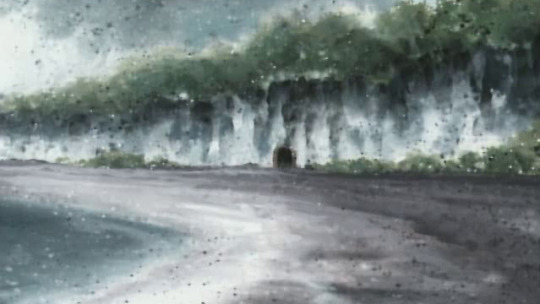
The cave beside the mysterious Dark Ocean (Source: Hulu)
Obviously, a reference to Lovecraft’s 1926 short story “The Call of Cthulhu,” this episode was initially conceived as the starting point for an eventually abandoned story arc about the mysterious Dragomon entity. As if this didn’t make the episode interesting enough, it’s significantly darker in tone compared to the series’ typical upbeat mood. Kairi, an otherwise confident and outspoken girl, suddenly develops strange dreams and Lain-reminiscent behavior. Kairi eventually begins to develop hallucinations about being underwater and being watched. Eventually, she finds herself staring out at an ocean and exploring a dark cave — somewhere neither in the Digital World nor the real world. This is when things get uncomfortable — even in a reality where traveling between cyberspace and the real world is possible, there are still unknowable “in-betweens” yet to discover. Again, the slow unraveling of horror isn’t the reveal of Dragomon, but rather Kairi’s atmospheric aloneness in realizing the reality she’s taken for granted can suddenly be uprooted without warning. Classic existentialist cognitive dissonance. But, y'know. For the kids.
No One Can Hear You Scream in Cyberspace
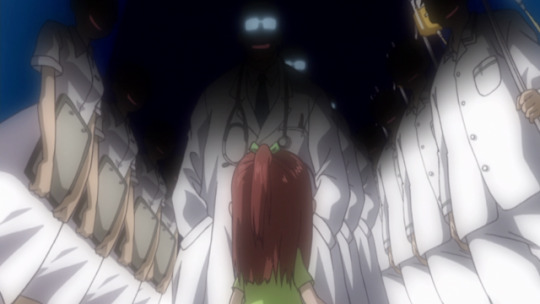
Jeri is psychologically tormented by the D-Reapers and relives her mother's death in the hospital (Source: Hulu)
After Digimon Adventure 02, Konaka would continue exploring this theme of protagonists inadvertently entering “new worlds” and having to reconcile their identities as a consequence. Like Lovecraft’s characters uprooted by the mere knowledge of cosmic horrors in isolation, Konaka’s characters must sink or swim when it comes to reality-shattering revelations. Konaka’s writing on 2001’s Digimon Tamers strongly flirts with these ideas, going beyond a simple “deconstruction” of the series’ basic premises toward a more psychological direction. Although Tamers' main protagonist Takato is himself an idealistic fan of an in-universe Digimon franchise, Tamers doesn’t forego the very real consequences of abruptly being spirited away to a violent new world. The kids aren't simply away at summer camp anymore — after a few dozen encounters with god-like creatures, the mental strain begins to slowly creep up on the DigiDestined. Rather than escaping without consequences, Konaka’s DigiDestined have to face the music and realize their escapist fantasies about Digimon aren’t what they imagined. This version of the Digital World isn’t morally flat, but something borderline Eldritch that becomes fully realized in the series finale.
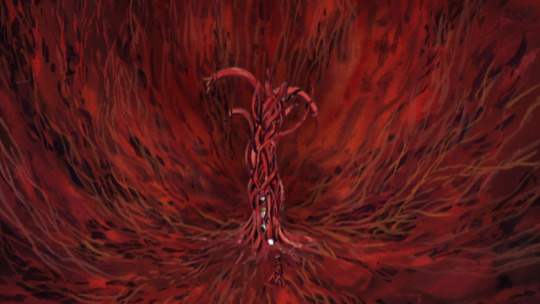
Jeri captured by the D-Reapers with Calumon (Source: Hulu)
In Tamers' climatic arc, Jeri, Takato’s eccentric classmate and fellow Digidestined, is abducted by man-made programs called “D-Reapers” as they take over the city. The D-Reapers, who intend to eliminate both the human and Digimon world, attempt to transform Jeri into the “Mother D-Reaper” by channeling the traumatic memories of her mother’s death. As notorious as Tamers' ending has become, it's perhaps not as brutal in the broader context of Konaka’s work. While captured, the D-Reapers keep Jeri in a Nyarlathotep-like cyber-flesh tower — similar to Tsukamoto’s half-man, half-machine character from Tetsuo: The Iron Man. Jeri doesn't have the intermediary of a Digimon to help — her partner Leomon is gone — and therefore has to face the unintelligible cosmic-cyberpunk D-Reapers alone. The “real” Jeri is momentarily gone. Like Lain’s lost identities in The Wired. Again, an adolescent protagonist must face the horror of losing one's self in a world with no logic. For a moment, she becomes truly hopeless, believing that this is "fate," recalling the phrasing doctors used described her mother's death. Thankfully, Jeri recovers and reunites with her friends as the equilibrium between the Digital World and reality are stabilized. But the point still stands: Our most intimate fears far surpass anything else we can face in the most alienating of scenarios.
The Petty Exorcist
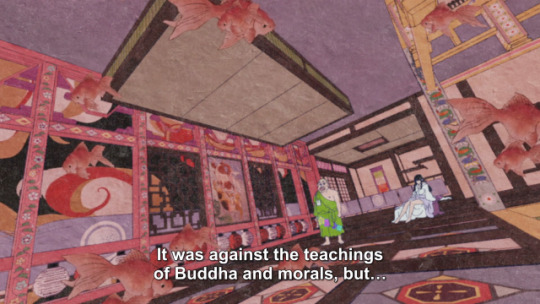
Genkei confides to The Medicine Seller aboard the ship
Beyond flights of cyberpunk cognitive dissonance fancy, Konaka’s work on the 2007 series Mononoke draws a more direct line back to his origins in Japanese horror cinema. A spin-off of the Ayakashi: Samurai Horror Tales series, Mononoke focuses on a pointy-eared man known as the “Medicine Seller” and his mission to terminate malicious spirits called “mononoke” across feudal Japan. Konaka’s story-arc “Sea Bishop” pays homage to classic funayūrei (boat spirit) ghost stories with a whodunit twist after someone sabotages the ship's navigation. Having wandered into the Dragon Triangle, a dangerous part of the Pacific Ocean full of evil spirits, a monk aboard named Genkei is suspected of the deed. Rather than immediately deal with any suspected mononoke, the Medicine Seller must decipher the true reason Genkei led them astray — his challenge isn’t an exorcism, but rather distinguishing petty human lies from truths. Genkei explains he did so to free his sister's spirit, who was supposedly sent to sea in his stead as a human sacrifice. Up to this point, Genkei’s intentions seem noble until his manipulative past is revealed: He had been fighting incestuous thoughts and guilt for years, having only become a monk to cope with his feelings. His sister died in vain.
The True Face of Horror Is Your Own
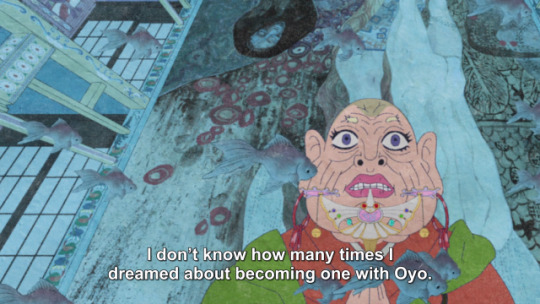
After the Medicine Seller reveals he knows someone is lying on the ship, Genkei gives his confession
Satisfied with Genkei's understanding he has been living a lie, the ship's mononoke finally emerges to be slain. It’s only this expulsion of a private fear that allows the Medicine Seller to finish his work. This time, no one is being manipulated by spirits or supernatural entities — all that remains is one person's terrifying inability to see beyond the lies they forced themselves to believe. The "real" you is worse than anything you can imagine.
Konaka’s fiction rarely gives us easy answers. While his work may seem oblique and impenetrable at first, these are fundamentally stories about people’s biggest fears being themselves and what they believe they know to be true. Although the novelty of being whisked to a fantastical world is alluring, Konaka doesn't downplay the expected alienation and anxieties of his characters. For as wide-ranging and genre-agnostic as his many series are, they never lose track of what fundamentally makes this flavor of horror unique: an embrace of the uncanny, the bizarre, and unflinching honesty.
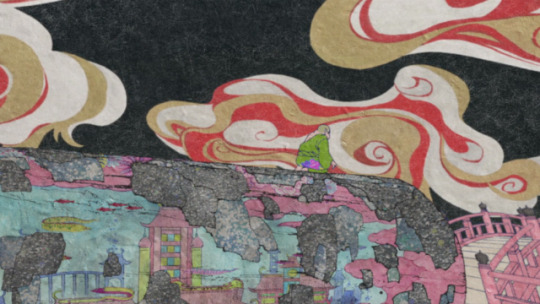
What spooky anime gives you nightmares? Let us know in the comments!

Blake P. is a weekly columnist for Crunchyroll Features. Impmon did nothing wrong. His twitter is @_dispossessed. His bylines include Fanbyte, VRV, Unwinnable, and more.
Do you love writing? Do you love anime? If you have an idea for a features story, pitch it to Crunchyroll Features!
18 notes
·
View notes
Note
(1/3)How does one deal with feeling like your friends are neglecting you? I have these couple of friends that lately I feel like I don't hang out with unless I'm the one initiating. When we do see each other everything is going well, but I feel like maybe they take me for granted, or maybe I was the only one thinking that we're friends, while they don't care that much about me and don't really miss me if we go months without seeing each other.
[con’t: Frankly I want to just drop out of contact with them and “test” wether or not they’ll even make an effort to reach out to me, and if they not then why should I?. But at the same time, I’m aware that we all have our own lives to deal with, and people have different ideas of how much effort should be put into “maintaining” a friendship. Also, I never really communicated that I feel this way (cause I don’t really communicate feelings openly like that) and instead always just focus on having a good time with them, so if I were to suddenly make this an issue I feel like it could come out of the blue from their perspective. Should I just stop trying with them and see what happens? And if I were to pursue the issue, how would I do it without putting a needless pressure on them and making things weird? - INFJ]
Ignoring feelings is the road to ruin for Fs. Genuine question: How important are your feelings to you? For example, when you feel neglected or taken for granted, do you honor those feelings and treat them as important? They seem important to you, otherwise, you’d easily brush them off. If feelings are important to you, why can’t you talk about them, and why shouldn’t people talk about them? Is your perspective not important in a relationship? Why do you relate feelings to “pressure” or being “weird”? This seems to imply that you think it’s somehow “unnatural” to have feelings, otherwise, you wouldn’t ask how to “deal” with them as though they are some kind of plague or obstacle?
First of all, in a relationship, people owe each other certain agreed upon duties and responsibilities. If you relinquish them, the relationship ends as there’s no commitment to each other. You seem to think people owe you more than they’re giving you, perhaps rightfully so (as INFJs are often devoted friends to a fault), while you also recognize that different people have a different conception of what their duties and responsibilities are. How are two people, with two different conceptions of their duties and responsibilities, supposed to get onto the same page without DISCUSSING their conceptions and forging middle ground? It’s not magically going to happen without any effort. Long-term relationships require effort to sustain, and both parties must agree to putting in a relatively equal amount of effort, otherwise one party will always feel cheated. If someone isn’t willing to put in the effort, then you’re barking up the wrong tree and should simply move on. This connects to the next point.
Second, if someone doesn’t contact you as often as you’d like, it is unwise to speculate and ascribe motives to their behavior without knowing the facts of their situation. You feel hurt, fine, but don’t jump to conclusions and claim that they don’t care or that they don’t miss you. This kind of judgmental leap is unwarranted, and it actually reflects on your emotional insecurity rather than their moral character. Do you act on every thought and feeling that comes your way? You clearly don’t, because your question is about feeling neglected but not doing anything about it. People can miss you a lot yet still not contact you, people can care about you a lot yet still not contact you, for reasons that you aren’t aware of, because you don’t know what’s really happening inside them. Maybe they’re good friends, maybe they’re jerks. The point is that you don’t really know because you’re overlooking a lot of different possibilities by jumping to conclusions.
INFJs with poor emotional intelligence are often very judgmental (Ti fail), because they aren’t aware that negative emotions have hijacked their speculative process, and they believe that their “intuitions” about people are god-given truths. This often sabotages their relationships over and over again. Nobody likes to be misjudged or wrongly accused, and it’s not a good habit to go around judging people without giving them fair opportunity to present the facts of their case. I’m guessing the reason that you fear talking about it is because you know that the anger you feel in your heart is going to create a volatile situation. And the anger is there because you have jumped to a negative conclusion about their moral character. Blame is a defense mechanism that grants a false sense of power, FJs usually do it to deflect their feelings of hurt/inadequacy/inferiority.
A much wiser strategy is to figure out the facts rather than indulging blame. Once you have the facts, you’d be in a much better position to decide what to do. What’s stopping you from genuinely asking people why they don’t initiate contact? That would naturally open up a normal conversation/negotiation about how much to contact each other. Be honest: Do you actually want to know the truth, or do you like sitting in judgment of people and stewing in your negative feelings (as many INFJs do)? And you even want to “test” your friends in an experiment to prove your negative judgment, which will, of course, turn out exactly as you expect because you’re intellectually dishonest. It’s easy to hold a false belief when you rig the experiment and never actually open yourself up to real counter-evidence. It’s easy to maintain an illogical belief when you have already defined both the cause (bad moral character) and the effect (taking you for granted) in playing the judge, jury, and executioner. You cannot claim to know things through mere speculation, so stop leaning so heavily on Ni. Get the facts from the horse’s mouth instead of presuming to know.
Third, if you are afraid of conflict, you’re never going to get very far in relationships, because relationships are inherently messy and full of conflict. Two people cannot reach a place of mutual acceptance without going through the process of reconciling their differences. There’s nothing wrong with individual differences, the issue is whether you are genuinely able to accept that they exist, on both ends. The decisions that you have made indicate that you can’t accept your feelings. You say that you focus on having a good time, which is often the indirect Fe way of saying that your true feelings remain hidden. By not raising this issue in your relationships, you inadvertently inform other people that your feelings don’t matter, and downplaying yourself cannot lead to a satisfying relationship, can it? It is the fact that you have left your feelings unresolved for so long that makes this situation into “a thing” that you now fear raising with them and now even motivates you to slam the door. The molehill (of innocent differences) has become a mountain (of negative condemnations).
You can’t expect that others will know how to accommodate your needs if you never make your needs known. How are people supposed to know how to care for you if you don’t instruct them? How are you to know why they don’t initiate contact if you never ask them? The point is that these discussions are necessary and constructive for relationship building. If you want to get better at having them, then start having them and learn from any missteps. Communication is an art, a dynamic process that requires adapting to the circumstances of the moment. There are some things in life that mere speculation can never prepare you for, so stop leaning so heavily on Ni. Learn how to do it by simply doing it and gaining experience.
57 notes
·
View notes
Note
Love your analyses. (You are to Sanditon what jbuffyangel was to Arrow.) Question about 1x03, When Sidney asks Charlotte for “feedback,” her first question is why didn’t he help Tom more. When Sidney says it wasn’t fair. he’d done all he could, she says, ”Have you?” Did she inadvertently contribute to the demise of her own relationship? Sidney is a loyal brother, but he’s also already in love with Charlotte and, whether he realizes it or not, wants her approval.
Before we get started on the ask, I would like to thank everyone who has sent me messages or asks over the past few days. I really appreciate your guys’ interest in my blog and Sanditon opinions and it’s immensely satisfying to me to play a part in the growth of the very new Sanditon fandom.
I have many Sanditon related projects in the works at the moment, namely a new fanfic one shot that should be uploaded in the next couple of days, a very exciting meta that I think you’ll all love and I need to get started on my Christmas fic if I am to finish by the middle of December as I have announced. All of that in addition to my and Mrs. @kitten1618x ‘s Sanditioncreative blog which will be hosting the first Sanditon Christmas event this year.
All of this is to say that I might not be answering your questions as quickly as I would otherwise. If that happens, please don’t get discouraged! I will answer ALL asks eventually, whenever I find the time to work on them. To that end, I would also kindly ask all of you to please send your asks solely to my ask me anything inbox because if you send it via replies or private message, they will end up getting lost and I will forget to answer them.
Hope this works for everyone! Let’s get to the ask …
Oh, nonnie … I’m pretty sure you had no idea what you were getting yourself into when you sent this ask but strap in … because the time has finally come to talk about …
Tom THE WORST Parker

Leaving aside the torch and pitchfork party we’ve all thrown for Tom, I do think we should take a moment and give Kris Marshall a shout out for an outstanding job playing this character. Look at the desperation in his eyes, the strained smile, the implied pressure he is applying on his target (Sidney as per 90% of the time). He even does that annoying calling people over with your hand as if they were your dog thing that drives me nuts!
Fortunatelylori: Put the hand away, Tom, unless you want me to cut it off! Arghhh!!!
Now, you might rightly ask why we’re going to talk about Tom when your ask is about Charlotte and how she might have ended up sabotaging herself.
The thing to keep in mind is that Charlotte Heywood is our entry point into Sanditon. We are being introduced to this world and these characters through her eyes. So we are inclined to take her opinion on everything that is occurring as gospel. However, we should remember a few things about Charlotte: despite having excellent instincts and insight into people, she is still very much a young, inexperienced girl who has lived a very sheltered life. In addition to that, she is very kind hearted and a true romantic.
All of that makes her prone to having better opinions of people than she should at times. For example, she thinks Otis is “a good man who made one terrible mistake” because she doesn’t truly grasp the seriousness of his gambling addiction and because she feels that if he truly loves Georgiana then he can’t really be bad.
Her opinion of Tom is similar to that. Tom is, if not a nice man (he isn’t but we’ll get to that), he’s at the very least a pleasant one and that outward ease and friendliness makes her empathize with him.
On the other hand, her major issue with Sidney is her inability to figure him out and his desire to keep people at arm’s length:
Charlotte: You are determined to remain an outlier. God forbid you give something of yourself!
Sidney: Please do not presume to know my mind, Miss Heywood!
Charlotte: How can anyone know your mind? You take great pains to remain unknowable.
Again and again, she reproaches him for not being more involved with Georgiana, for not helping Tom, for trying to separate himself from those around him. And while there is truth to what she’s telling him, it also reveals that Charlotte can be easily taken in by people who display affection and/or involvement towards others, even if the cost of that is very steep.
She judges Sidney harshly for not behaving that way, while allowing Otis and Tom to get away with their bad behavior because they do involve themselves in people’s lives and give “proof” of caring and thus make Charlotte think they are inherently good people. However, what she fails to see is the selfish reasons behind those characters’ actions.
I did reblog a gif set of Charlotte telling Sidney to help Tom more and made the joke that she shot herself in the foot. But that was me joking and noting the dramatic irony that the writing employs.
The serious interpretation of Charlotte’s line isn’t that she unknowingly acted towards the demise of her own love story but rather that she completely misunderstood the dynamic of the Tom/Sidney relationship.
In her mind, it was Sidney who held all the power in his relationship with his brother, as the younger, more handsome, more successful sibling to the put upon and fate tested idealist Tom. As such, Sidney’s “refusal” to help him seemed petty and cruel to sweet angel Charlotte who is utterly fascinated by what Tom is doing in Sanditon
And by and large I think the viewers have also bought into that image of Tom and Sidney.
But I would like to propose a different interpretation:
There is no reason to assume that Sidney wasn’t helping Tom prior to Charlotte calling him on it. Why else would he have dragged Crowe and Babbington to the ball in episode 1? Why else was he getting his liver smashed in, boxing for their entertainment or playing at cards in the hotel restaurant? Why else would Tom talk about Sidney “profiting” from the success of Sandition if Sidney had not already invested in his brother’s project?
The problem isn’t that Sidney isn’t helping him. The problem is that Tom has an endless list of things he needs help with:
Sidney: At least this time I leave knowing you are in good heart. A new physician, a new regatta to plan. All is well with Tom Parker.
Tom: So it would seem … Oh, I say … I’m … I just wonder if while you’re in London you could stop by the bank for me and see if they might consider extending …
First he needs help attracting fashionable people to Sanditon. Sidney provides them. However, as he points out, there isn’t enough entertainment in Sanditon to make it worth their stay. I would suggest that’s Tom’s fault, not Sidney’s.
On that note, remember what Eliza said during the regatta:
Eliza: At the last regatta I attended, they raced Arab stallions. The one before that featured 18 clippers in full sail. But for sheer exhilaration what could compare to a sand castle competition?
Leaving aside that this is Eliza and we all hate her, what does this tell you about Tom and his understanding of his clientele? Because it seems to me he wants Sanditon to be the Regency’s version of Monaco while offering the quaint entertainment of whatever seaside resort your granny goes to.
He then reveals that he has financial troubles and needs money and eventually sends Sidney hat in hand to beg the banks for a loan. Sidney doesn’t want to do it at first because he knows there’s no point to it but because Charlotte made him feel guilty, he relents. The result is what he already knew: no more credit for Tom. This is Tom’s reaction:
Tom: No, no! That is not possible! Clearly you forgot to explain about the regatta. We are soon to be the most popular resort on the South Coast. Did you even mention Dr. Fuchs?
Sidney: Tom, I spoke to 3 different banks, at lenght. Not one of them is willing to extend your credit any further.
Tom: What do you suggest I do now, Sidney? What exactly do I do now?

Look at that violent, desperate reaction! That’s what emotional blackmail looks like. And that, my friends, is abuse. Because in one fell swoop Tom has not only put the blame on Sidney for something that is out of his control (Sidney can’t force the bank to give Tom money) but also put the eventual consequences Tom will face squarely on Sidney’s shoulders.
Also Tom decides to go buy necklaces for his wife instead of paying his workers. When they argue with him at the cricket match, he walks away in a fit, leaving Sidney, and Charlotte, to clean up the mess. It’s also up to Sidney to resolve the workers’ problems by “loaning” Tom the money to pay them. I’ve put loan between “” because one has to be truly naïve to think Tom would have ever paid that loan back.
I would suggest that Tom is an irresponsible, selfish man and a terrible businessman who doesn’t need help. What he needs is a business partner that will control his terrible decision making and handle all of the business aspects of Sanditon while Tom scribbles away at his architecture plans (plans that I suspect were mostly created by James Stringer and that Tom is taking credit for).
And on some level, I think, Sidney knows that as well, which is why he fights Tom’s desire to involve him in the running of Sanditon at every turn:
Sidney: I’m sorry but I have done everything you’ve asked of me, Tom. I’m not your keeper. I will gladly own my mistakes but I cannot own yours.
Oh, you sweet summer child …
I don’t think it’s Sidney’s dream to manage a seaside resort, not is it his responsibility. His brother is an adult who should be held accountable for his own actions. However, at the rate this story is going, running Sanditon while Tom gets all the credit for its success is exactly what Sidney will end up doing.
His reluctance to get more sucked into Tom’s schemes in the beginning, I think, has less to do with Sidney being a bad person or an outlier and more to do with knowing that once he relents, there will be no end to Tom’s demands on him and he will end up being his keeper for all eternity.
Episode 8 also reveals something very interesting about the entire Parker family: they are all enablers of Tom’s bullshit. Arthur is the first to offer up his inheritance on a silver platter, Diana refuses to let him blame himself and Mary is ready with a love declaration the moment Tom shades one crocodile tear.
Despite being the hardest one to crack out of all of them, Sidney is ultimately one more enabler to Tom. He hops on the first carriage to London and gives up his life in order to spare Tom prison time.
From where I’m sitting, the dynamic of these 2 brothers is the complete opposite from what Charlotte estimated. It is Tom that holds all the power and he and Sidney are involved in a toxic relationship that has been going on long before Charlotte ever met either one of them. Perhaps it started the moment Tom paid Sidney’s debts before he sailed to Antigua. Perhaps it started long before that.
However, I don’t think Charlotte’s intervention in episode 3 influenced Sidney’s final decision. What ultimately sealed the deal on that was the emotional blackmail Tom has been inflicting on Sidney for years, Tom’s expectation that everyone in his life do everything to service him and his family’s compliance with those wishes and, not least of it, Sidney’s lack of selflove that allowed him to prioritize his brother’s temporary stint in prison (he could have worked to pay off Tom’s debts over time; there’s no law that says Tom had to be in prison forever) over his own permanent misery.
I’m not sure this was the turn you were expecting my answer to take but I hope you found it useful nonetheless.
152 notes
·
View notes
Text
What sort of vision do you have for your future?
We are all doing it much of the day, but mostly it is not in our awareness; it is just going on in the back ground shaping our experience of the day, our week and our lives. It is there determining whether we will feel excited and enthusiastic about life, or whether we will feel overwhelmed, hopeless, helpless, stressed, ANXIOUS and DEPRESSED?
What is it that we are doing pretty much all day, everyday?
What is probably the single most important thing that we do every day, that absolutely needs a creative solution, if we are ever going to be HAPPY NOW?
Future visioning
Every day we are making MEANING of the events in our life and we are making predictions about what all of this means for our FUTURE!!
Essentially we are visioning our future every single day – by making meaning of the events in our lives, we will on some level wonder what all of this means for us in the future:
Does this mean that we are destined for success which breeds optimism, fun and a healthy pragmatism about what needs to change and what YOU are going to DO ABOUT IT to improve things for the better? OK, this didn’t work, what can I do to change it or increase the odds of success next time?
OR
Does this event mean that there is no hope for you and that you may as well stress and worry, give up now or fight, fight, fight to make this not a reality! Either way, you are not experiencing a state of calm, ease and grace as you move through the world, and you are not EMPOWERED to solve problems when these modes are activated!
Are your predictions robbing you of happiness?
So this future visioning – the expectation about whether you will or will not succeed – is SUPER POWERFUL and impacts your experience of your day, every day.
So you could begin to wonder:
What is it that I am expecting from my life?
What is it that I am expecting in the future?
What is it that I am expecting from myself?
What is it that I am expecting from others in my life?
AND
What does this MEAN for my experience of life TODAY?
If you have contemplated these questions, then you will just know how powerful your expectations are, both in impacting your capacity to problem solve and create a positive future for yourself AND it directly impacts your experience of life RIGHT NOW!! Your HAPPINESS right now!
Your vision for the future will directly shape
How you feel today;
Any action that you will or won’t take today;
And your actions, or lack there of, will directly shape YOUR FUTURE!!
When acting unconsciously from negative expectations and predictions for the future, you are likely to find yourself inadvertently reinforcing negative life circumstances and mood states like stress, DEPRESSION, ANXIETY and overwhelm. You might find yourself saying: ‘see I told you so, told you my future wasn’t bright, told you I couldn’t be HAPPY or SUCCESSFUL, because nothing has changed, things are exactly the same, on repeat!’
Until you start to look at what you are predicting for yourself and your life, and how this impacts your mood states and ACTIONS TODAY, then you are likely to create a self-fulfilling prophecy, one in which you create the circumstances you expected!
Human beings loved to be proven that they are right, even if it means that they sabotage their own HAPPINESS!! We are complicated creates, hey!
So do you want to be right, or do you want to be HAPPY?!
Are you prepared to look at your future visioning and begin to question your expectations and let your confidence in your own expectation begin to lose its grip?
You could begin to question the negative expectations to improve your HAPPINESS:
When have my negative expectations been proven wrong?
When has this expectation NOT been the case?
When have I in fact succeeded, when I expected to fail?
What does this say about the negative expectations if they, in fact, can be proven wrong at times?
What does this say about my CAPACITY to succeed?
What if I were to prioritise THIS success side of the equation, and see that focusing on this particular quadrant is THE MOST HELPFUL thing that I could do to experience HAPPINESS?
What is most important? Reinforcing outdated and negative beliefs about yourself and your capacity OR being HAPPY?
After all, if both examples exist in your life – times when things have not worked out for you AND times when you have experienced success and/or happiness – how do you determine what is most TRUE? Why wouldn’t you choose to focus on the side of the equation that helps you to feel happy, vital and vibrant?
Why not give it a go, and see how it FEELS? You can always go back to the old habit if you choose!
Remember, that Bodhi starts with you
Toni-Anne
PS: Have you been watching the Livestreams that we have been doing on the Facebook page? If not then please join us tomorrow, Saturday at 1030am ACST. Just press below to head on over to the Under the Bodhi Tree facebook page and join in!
Watch the weekly Livestream
Disclaimer: This information is in no way intended to replace psychological treatment should you be suffering from clinical depression and anxiety and be in need of personalised, individual therapy. This information can be used as an adjunct to your therapy and you can feel free to raise it with your therapist should you have one. If you are in any way suicidal, please contact your therapist or emergency support services.
#anxiety#anxietyfree#depression#depressionfree#happiness#happy#expectations#mindset#negativepredictions#futurevisioning#liveyourpurpose#liveonpurpose#change#takeaction
0 notes
Text
6 Pieces of Bad Advice We Give Our Kids – And What to Do Instead
Most parents want their kids to be successful in life—and so we teach them attitudes that we believe will help them achieve their goals. But as I learned while researching my book The Happiness Track, many widely-held theories about what it takes to be successful are proving to be counterproductive.
Sure, they may produce results in the short term. But eventually, they lead to burnout and—get this—less success. Here are a few of the most damaging things many of us are currently teaching our children about success, and what to teach them instead.
What we tell our kids: Focus on the future. Keep your eyes on the prize.
What we should be telling them: Live (or work) in the moment.
It’s hard to stay tightly focused. Research shows our minds tend to wander 50% of the time we’re awake. And when our minds wander, we often start to brood over the past or worry about the future—thereby leading to negative emotions like anger, regret, and stress.
A mind that is constantly trying to focus upon the future—from getting good grades to applying to colleges—will be prone to greater anxiety and fear. While a little bit of stress can serve as a motivator, long-term chronic stress impairs our health as well as our intellectual faculties, such as attention and memory. As a consequence, focusing too hard on the future can actually impair our performance.
Children do better, and feel happier, if they are learn how to stay in the present moment. And when people feel happy, they’re able to learn faster, think more creatively, and problem-solve more easily. Studies even suggest that happiness makes you 12% more productive. Positive emotions also make you more resilient to stress—helping you to overcome challenges and setbacks more quickly so you can get back on track.
It’s certainly good for children to have goals they’re working toward. But instead of always encouraging them to focus on what’s next on their to-do list, help them stay focused on the task or conversation at hand.
What we tell our kids: Stress is inevitable—keep pushing yourself.
What we should be telling them instead: Learn to chill out.
Children are feeling anxious at younger and younger ages, worrying about grades and feeling pressure to do better at school. Most distressingly, we’re even seeing stress-induced suicides in children—especially in high-achieving areas like Palo Alto in Silicon Valley.
The way we conduct our lives as adults often communicates to children that stress is an unavoidable part of leading a successful life. We down caffeine and over-schedule ourselves during the day, living in a constant state of overdrive and burning ourselves out—and at night, we’re so wired that we use alcohol, sleep medication, or Xanax to calm down.
All in all, this is not a good lifestyle to model for children. It’s no surprise that research shows that children whose parents are dealing with burnout at work are more likely than their peers to experience burnout at school.
I recommend that parents consider teaching their children the skills they will need to be more resilient in the face of stressful events. While we can’t change the work and life demands that we face at work and at school, we can use techniques such as meditation, yoga and breathing to better deal with the pressures we face. These tools help children learn to tap into their parasympathetic “rest and digest” nervous system (as opposed to the “fight or flight” stress response).
What we tell our kids: Stay busy.
What we should be telling them: Have fun doing nothing.
Even in our leisure time, people in Western societies tend to value high-intensity positive emotions like excitement, as opposed to low-intensity emotions like calm. (The opposite is true in East Asian countries.) This means that our kids’ schedules are often packed to the brim with extracurricular activities and family outings, leaving little downtime.
There’s nothing wrong with excitement, fun, and seeking out new experiences. But excitement, like stress, exhausts our physiology by tapping into our “fight or flight” system—and so we can unwittingly prompt our children to burn through their energy after school or on weekends, leaving them with fewer resources for the times when they need it most.
Moreover, research shows that our brains are more likely to come up with brilliant ideas when we are not focusing (thus the proverbial a-ha moment in the shower). So instead of over-scheduling kids, we should be blocking out time when they can be left to their own devices. Children can turn any situation—whether they are sitting in a waiting room or walking to school—into an opportunity for play. They may also choose calming activities like reading a book, taking the dog for a walk, or simply lying under a tree and staring up at the clouds—all of which will allow them to approach the rest of their lives from a more centered, peaceful place. Giving your kids downtime will help them to be more creative and innovative. And just as importantly, it will help them learn to relax.
The point here is not to never challenge them or deprive them of opportunities for learning, the point is not to overschedule and overcommit them to the point where they don’t have opportunities to learn independent play, to be with themselves and daydream, to learn to be happy just being rather than always doing.
What we tell our kids: Play to your strengths.
What we should be telling them: Make mistakes and learn to fail.
Parents tend to identify their children by their strengths and the activities that come naturally to them. They say their child is a “ a math person,” a “people person,” or “an artist.” But research by Stanford University’s Carol Dweck shows that this mindset actually boxes your child into a persona, and makes them less likely to want to try new things that they may not be good at. When a kid receives praise primarily for being athletic, for example, they’re less likely to want to leave their comfort zone and try out for drama club. This can make them more anxious and depressed when faced with failure or challenges. Why? Because they believe that, if they encounter obstacles in a given area, that make them “not good at” the activity.
But our brains are wired to learn new things. And it can only be a good thing to learn from our mistakes while we’re young. So instead identifying your child’s strengths, teach them that they actually canlearn anything—as long as they try. Research by Dweck, author of best-selling book Mindset, shows children will then be more optimistic and even enthusiastic in the face of challenges, knowing that they just need to give it another go to improve. And they will be less likely to feel down about themselves and their talents.
What we tell our kids: Know your weaknesses, and don’t be soft.
What we should be telling them: Treat yourself well.
We also tend to think that criticism is important for self-improvement. But while self-awareness is of course important, parents often inadvertently teach their children to be too self-critical. If a parent tells a child that she should try to be more outgoing, for example, the child may internalize that as a criticism of her naturally introverted personality.
But research on self-criticism shows that it is basically self-sabotage. It keeps you focused on what’s wrong with you, thereby decreasing your confidence. It makes you afraid of failure, which hurts your performance, makes you give up more easily, and leads to poor decision-making. And self-criticism makes you more likely to be anxious and depressed when faced with a challenge.
Instead, parents should encourage children to develop attitudes of self-compassion—which means treating yourself as you would a friend in times of failure or pain. This doesn’t mean that your children should be self-indulgent or let themselves off the hook when they mess up. It simply means that they learn not to beat themselves up. A shy child with self-compassion, for example, will tell herself that it’s okay to feel shy sometimes and that her personality simply isn’t as outgoing as others —and that she can set small, manageable goals to come out of her shell. This mindset will allow her to excel in the face of challenge, develop new social skills, and learn from mistakes.
What we tell our kids: It’s a dog-eat-dog world—so look out for number one.
What we should be telling them: Show compassion to others.
Research shows that, from childhood onward, our social connections are the most important predictor of health, happiness, and even longevity. Having positive relationships with other people is essential for our well-being, which in turn influences our intellectual abilities and ultimate success.
Moreover, likability is one of the strongest predictors of success—regardless of actual skills. Wharton professor Adam Grant’s book Give & Take shows that you express compassion to those around you and create supportive relationships instead of remaining focused on yourself, you will actually be more successful in the long term—as long as you don’t let yourself be taken advantage of.
Children are naturally compassionate and kind. But as psychologist Jean Twenge has written about in her book Generation Me, young people are also becoming increasingly self-involved. So it’s important to encourage children’s natural instincts to care about other people’s feelings and learn to put themselves in other people’s shoes.
It’s true that it’s a tough world out there. But it would be a lot less tough if we all emphasized cutthroat competition less, and put a higher premium on learning to get along.
Read Emma’s full book on the topic: The Happiness Track
Source: HarperOne
You’re reading 6 Pieces of Bad Advice We Give Our Kids – And What to Do Instead by Emma Seppala Ph.D. To stay updated on the science of happiness, health and social connection, follow Emma on Facebook, Twitter, and Google+!
http://ift.tt/2vkDGsp
Emma Seppala
from WordPress http://ift.tt/2uVRM0Y
from Blogger http://ift.tt/2tXbwA7
0 notes